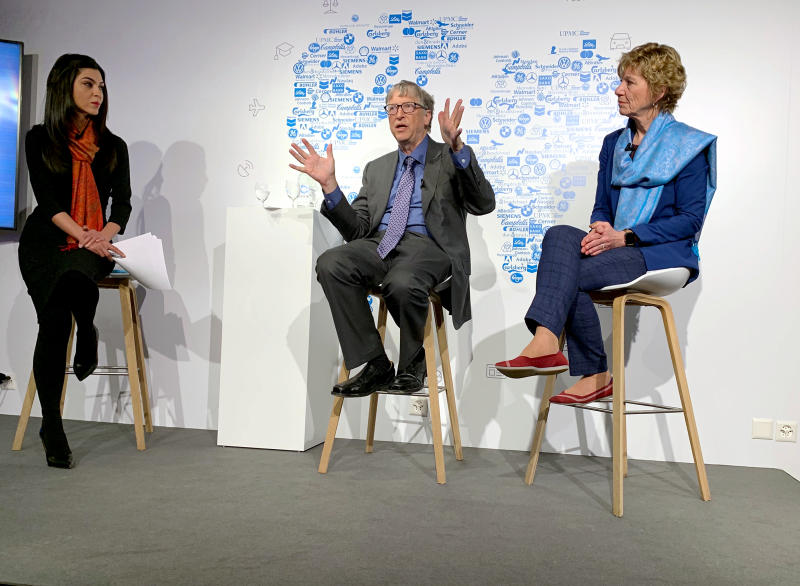World Economic Forum: Bill Gates on his best investment
Sign up now: Get ST's newsletters delivered to your inbox

Billionaire philanthropist Bill Gates at an informal discussion in Davos on Jan 23, with Dr Sue Desmond-Hellmann, CEO of the Bill & Melinda Gates Foundation. The session was moderated by TV anchor Shereen Bhan (left).
ST PHOTO: SUMIKO TAN
Sumiko Tan Executive Editor In Davos, Sumiko Tan
Follow topic:
The canapes looked delicious but, from the corner of my eye, I saw that the front row seats were quickly filling up.
No thanks, I told the waitress, hurried over and snagged the last available seat.
Half an hour later, Bill Gates strolled onto the small stage in front, cleared his throat and settled onto a high chair.
For the next hour, the Microsoft founder-turned-philanthropist shared updates on how he was trying to make the world a better place.
He spoke passionately with his arms mostly folded across his chest but sometimes spread out to make a point.
For a man with such incredible wealth - US$95.7 billion ($130 billion) according to Forbes - he doesn't carry himself with the swagger you see a lot of in Davos at this time of the year, when the World Economic Forum (WEF) takes place and world leaders and business bigwigs roll into town.
A young man from Bahrain sitting two seats away from me said he'd seen Mr Gates walking around the area earlier, very low-key.
The man next to me said that at one year's WEF meeting, he saw Mr Gates sitting by himself at a table. He decided to say hello and spent the next hour in conversation with the billionaire.
The event on Wednesday evening (Jan 23) was held at the Microsoft Cafe, one of many pop-up structures that big corporations set up in Davos during the WEF.
It was billed as an informal discussion with Mr Gates and the e-mail invitation came with a handwritten sign-off from "Bill".
In 2000, Mr Gates and his wife set up the Bill & Melinda Gates Foundation, which is the world's largest private charitable foundation.
Improving global healthcare is one of its key objectives, in particular combating infectious diseases like tuberculosis, malaria, Aids and polio in the world's poorest countries.
Over the last two decades, the foundation has donated more than US$10 billion to this effort.
The money has gone mainly to three groups it works with - the Global Alliance for Vaccines and Immunization (Gavi), the Global Fund to Fight AIDS, Tuberculosis and Malaria, and the Global Polio Eradication Initiative.
In a piece he wrote in The Wall Street Journal on Jan 22 under the headline "The Best Investment I've Ever Made", Mr Gates said a calculation has shown that the US$10 billion invested in the global health funds has turned into US$200 billion worth of social and economic benefits.
"They've created a lot of wealth, because when people aren't sick in bed, they can go to work or school," he wrote.
Mr Gates, 63, also made the point that while global health groups that buy and distribute medicine save lives, their funding from governments is in danger and philanthropies can't fill the gap.
It was a theme he returned to at the event on Wednesday, where he was joined by Dr Susan Desmond-Hellmann, an oncologist who is CEO of the Gates foundation.
He showed some slides to back the points he wanted to make:
First, statistics show that the world has become much healthier during the first two decades of the 21st century.
Most tellingly, there has been a dramatic decrease in deaths of under-five-year-olds in developing nations.
Also, for every dollar invested in global health, there has been dramatic and outsized returns in the health and productivity of young people in lower- and middle-income nations.
When it comes to global health, he said, a long-term view is needed. People tend to ignore this because they are focused on the here and now.
He acknowledged that the foundation has learnt lessons along the way. "I remember the very first clinics we did in Botswana, we probably over-designed them, a little gold-plated, too many doctors involved in all the decisions," he said to laughter from the audience.
Over time, processes have been streamlined and there has been more integration and discussions with countries where projects are rolled out, as well as with the private sector. Training, which was a weak point, has also been shored up.
He gave another example of bed nets, used to fight malaria, that tore quickly. The lesson learnt was it's better to pay a bit more and get more durable nets.
Dr Hellmann made the point that philantropy and the private sector can only do so much and will not be able to take over from what governments do.
To this, Mr Gates added that Gavi and Global Fund regard the basic health care system of a country as the key health delivery vehicle of their efforts.
Towards the end of the session, a man from Kenya rose to ask a question and prefaced it by saying he wanted to bring the gratitude of millions of families who have benefited from Mr Gate's money but don't know it.
"Thank you, thank you very much," he said as the crowd applauded warmly. "You probably don't get that often enough. The gratitude is visible in their faces, but they don't know you and I am here on their behalf."
From where I sit, I see Mr Gates nod at this - no smile - and give the barest hint of a shrug. He's not looking for gratitude, I think, he just wants to get the job done.

